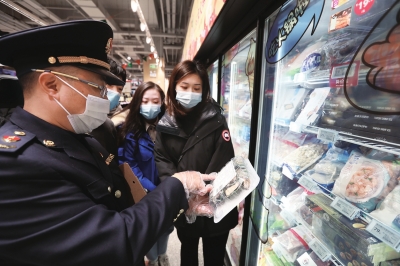Residents Inspect Epidemic Prevention of Imported Cold Chain Food

By Qi Chuanbin
Recently, the nucleic acid of the new coronavirus has been detected positive in imported cold chain food and its outer packaging in many places in China, which have made the public nervous on imported cold chain food. Is imported cold chain food still safe? On December 16, Hongkou District Market Supervision Bureau invited more than 10 residents as supervisors to follow the enforcement officers into a supermarket to learn about the epidemic prevention management measures of imported cold chain food, and experienced a lesson on how to protect themselves when they consume imported cold chain food.
In the frozen food display area, the enforcement officers randomly selected a package of mussels imported from New Zealand and asked the person in charge of the supermarket to show three certificates, namely, the quarantine inspection certificate of imported goods, the disinfection certificate of external packaging and the nucleic acid test report. "The certificates prove that all the mussels sold are imported after being verified by the customs department. They are sold in market after going through the disinfection of external packaging and being detected negative in nucleic acid test", the enforcement officials explained to residents.
At the scene, the law enforcement officers inquired the person in charge of the supermarket about the epidemic prevention measures of the imported cold chain food from receiving to putting on the shelves after it was sent to the supermarket, and checked the inspection records of the goods, the disinfection records of the store and other issues. According to the law enforcement officer, the imported cold chain food with the three certificates does not mean that it is safe. After receiving the food, the merchants need to disinfect the inner packaging. The disinfection regulations should be strictly implemented for the warehouses and freezers where the imported cold chain food is stored and the tools and utensils. In addition, the staffs who work with imported cold chain food should accept nucleic acid test monthly, so as to guarantee their health.
Then, the residents and law enforcement officers checked the epidemic prevention measures including supermarket epidemic prevention system, personnel management, procurement and storage, processing operation and sales management. Mrs. Ma, a resident, told that she was still a little worried when purchasing imported cold chain food before. However, after her participation in the activity today, she has a more comprehensive and profound understanding of the epidemic prevention requirements that imported cold chain food on the market must meet. Now, she feels at ease to have imported cold chain food. Finally, the enforcement officers demonstrated the six-step protection method in the processing and cooking imported cold chain food like housewives.
It is reported that in order to further strengthen the epidemic prevention and control of imported cold chain food, Hongkou District Market Supervision Bureau has issued and implemented a series of work measures. The Key Points for Supervision and Inspection of Cold Chain Food Operation was formulated. The inspection standards were refined and unified. Sampling and monitoring of new coronavirus in imported cold chain food was carried out in key places such as stores and supermarkets. Enterprises were continuously supervised to strictly implement requirements such as purchase inspection, traceability management, protection and disinfection, do a good job in personal management and conduct nucleic acid test to the staffs in high-risk position, so as to make the self-management of imported cold chain food enter the stage of institutionalization, systematization and standardization. Science popularization of imported cold chain food was stressed in communities for residents to adopt the way of correctly choosing imported cold chain food and grasp the right prevention method.